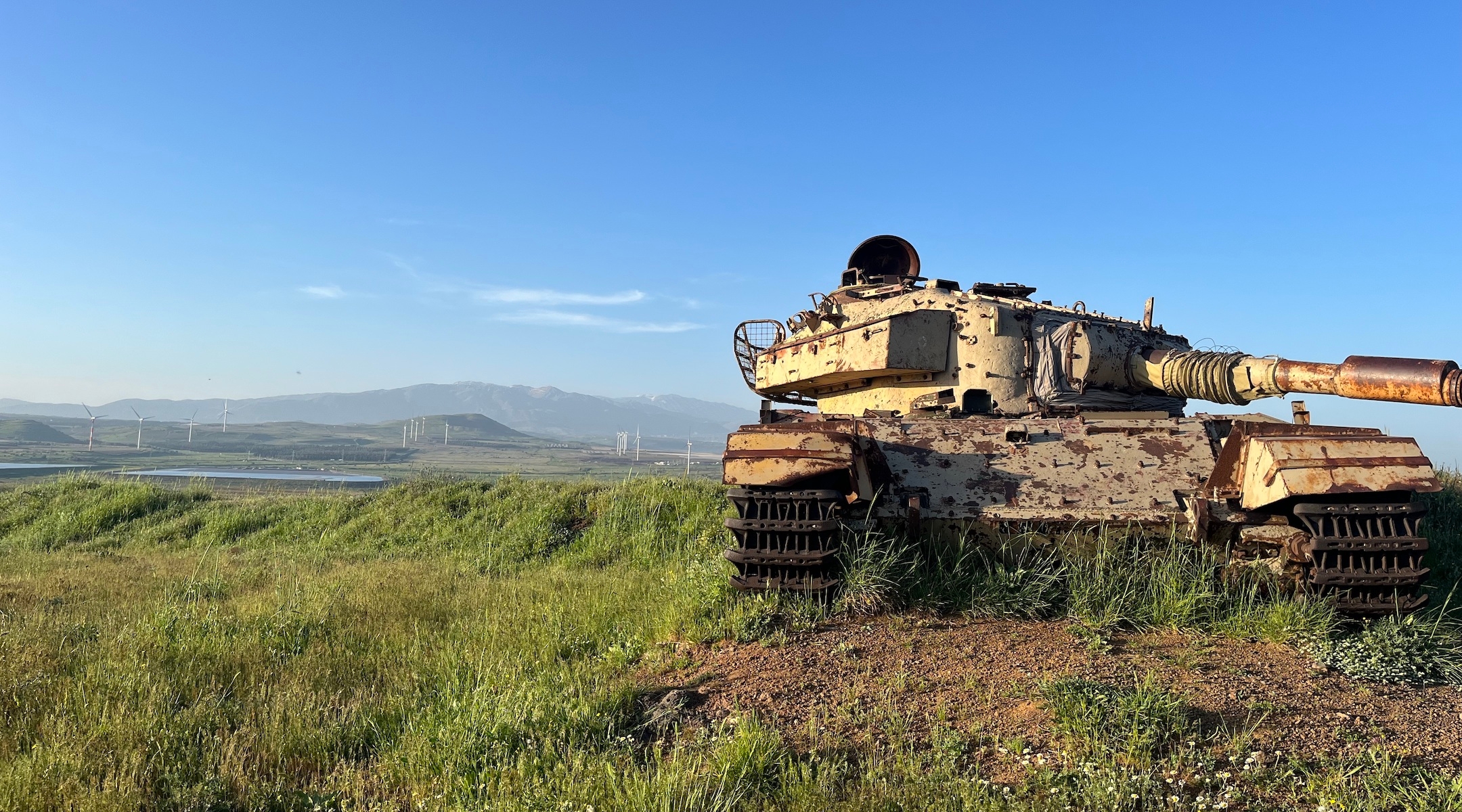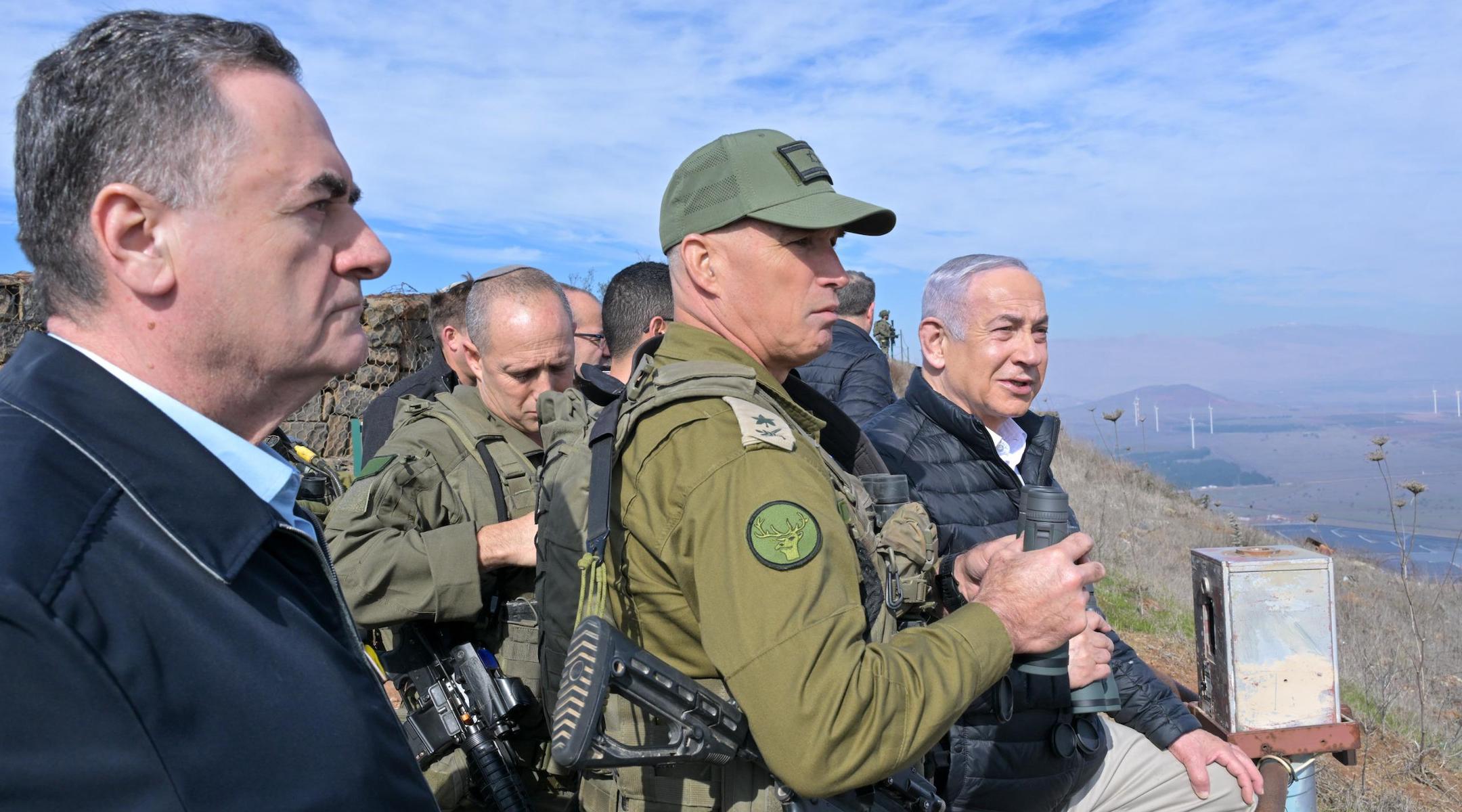Syrian dictator Bashar Assad has fled the country and his government has fallen to rebels, a swift and stunning collapse after more than a decade of civil war.
The country is now enveloped in joy and turmoil as hundreds of thousands of refugees stream home, political prisoners go free and Syrians — along with the rest of the world — wonder what’s next.
Also wrapped up in uncertainty: Syria’s neighbor and longtime adversary, Israel. Assad’s fall came after several of his regional partners have been weakened in Israel’s multi-front war, which began with Hamas’ Oct. 7, 2023, invasion.
Israeli troops entered a buffer zone with Syria over the weekend and its planes have reportedly begun bombing Syrian chemical weapons facilities and other targets in Damascus, the capital.
Beyond that, Israeli leaders are broadcasting optimism about the fall of Assad, a key Iranian ally, while girding themselves for the ascension of the jihadist-linked group that toppled him.
Events are still unfolding rapidly in Syria and the region. But in the immediate wake of Assad’s ouster, here’s what this means for Israel.
Oct. 7 likely contributed to Assad’s downfall.
To remain in power during the Syrian civil war, Assad relied on several allies — including Hezbollah, Iran and Russia.
Now, those allies have been weakened or are fighting elsewhere. Russia, which shored up Assad in 2015 at a key moment in the civil war, has focused its firepower on Ukraine since invading that country nearly three years ago.
Hezbollah, the Lebanese terror group that is also funded by Iran, sent thousands of its fighters to Syria to battle on Assad’s behalf.
Following Hamas’ invasion of Israel on Oct. 7, 2023, Hezbollah began shelling Israel’s northern border area. That conflict escalated sharply a few months ago and ended with a ceasefire two weeks ago, after Israel destroyed much of Hezbollah’s capabilities and leadership.
Iran, too, has engaged in a few rounds of direct conflict with Israel, during which Israel bombed its air defenses.
Israeli Prime Minister Benjamin Netanyahu called Assad’s defeat “the direct result of our forceful action against Hezbollah and Iran, Assad’s main supporters.” President-elect Donald Trump, too, credited “Israel and its fighting success” contributing to the chain of events.
On Sunday, President Joe Biden also said the Oct. 7 attack and Israel’s response led to Assad’s ouster. Iran, Hezbollah and Russia are “far weaker today than they were when I took office,” Biden said. After the Oct. 7 attack, he added, “Iran and its proxies chose to launch a multi-front war against Israel. That was a historic mistake on Iran’s part.”
Another Iranian ally is down.
Iran is widely seen as Israel’s chief adversary, and it funded and coordinated extensive efforts in the region to counter Israel. For Israel, Assad’s ouster means that yet another node of Iran’s so-called regional “Axis of Resistance” has been taken out.
But since Oct. 7, that alliance has been decimated. Its members include:
- Hamas, the Gaza-based terror group that has been all but destroyed after 14 months of war with Israel.
- Hezbollah, which has suffered a heavy blow in its conflict with Israel.
- The Houthis, a Yemeni terror group that has also bombed Israel and been hit with airstrikes from a multinational coalition.
- Assad in Syria, who is now deposed.
To both sympathizers and opponents, Assad’s downfall is a huge setback for Iran and its regional influence.
“Iran has suffered a strategic defeat with the fall of Assad,” tweeted Dennis Ross, a veteran former U.S. government official focused on the Middle East. He wrote that Iran’s “ring of fire around Israel is gone.”
He also noted that Iran transferred weapons to Hezbollah via Syria, which could now be impossible.“Without the Syrian land/air bridge, it can’t easily rebuild a defeated Hezbollah. Its enormous investment in Syria has gone down the drain,” he wrote.
Rania Khalek, a journalist who has expressed sympathy for Iranian aims and criticized the Syrian rebels, tweeted, “The resistance axis era is over. Regionally Israel/US won this battle and we have to recognize that and reflect internally on why and how.”
Israeli parliamentary opposition leader Yair Lapid called for Israel to take the opportunity of a teetering Iran to “work toward a diplomatic achievement” that will work toward Israel’s interests in Gaza and the West Bank.
The victorious rebel group is no friend of Israel’s — but has taken a pragmatic turn.
That doesn’t mean the rebels are an ally of Israel. The group that has led the offensive is Hayat Tahrir al-Sham or HTS, an Islamist organization that evolved out of the Nusra Front, a group that was affiliated with the terror group Al-Qaeda and with the Islamic State. A standard piece of that ideology is opposition to Israel.
“In terms of HTS’ stance on Israel, they’ve always been for the Palestinian cause,” said Aaron Zelin, a senior research fellow at the Washington Institute for Near East Policy who wrote a book on HTS called “The Age of Political Jihadism.” Zelin said HTS has celebrated Hamas attacks on Israel for years, including the Oct. 7 invasion, and has praised the Hamas leaders Israel has killed.
The group’s leader goes by the nom de guerre Abu Mohammad al-Jolani. The name indicates that the family of Jolani, 42, is from the Golan, the region that Israel captured from Syria in 1967 and later annexed. Zelin said Jolani’s father was originally from the Golan before moving to Damascus and Saudi Arabia, where Jolani was born.
That history has led to some trepidation in Israel.
“The events in Syria are far from a reason for celebration,” tweeted Amichai Chikli, the right-wing Israeli Diaspora affairs minister. “Despite the rebranding of Hayat Tahrir al-Sham… the bottom line is that most of Syria is now controlled by a subsidiary of al-Qaeda and ISIS.”
He added, “We can’t let the jihadists establish themselves next to our towns.”
Zelin, however, has documented a turn toward pragmatism by HTS. He called the group “somewhat pragmatic” and added, “I think that starting some with Israel would be suicidal from their perspective.”
A statement by HTS that Zelin posted to social media said the group was focused on “construction and progress” within Syria. The group added, “Liberated Syria looks forward to strengthening its relations with all brotherly and friendly countries on the basis of mutual respect and common interests.”

A rusting tank on a hill in the Golan Heights overlooking Syria is a vestige of an earlier war. The area last saw serious fighting during the 1973 Yom Kippur War. (Uriel Heilman)
Israel and Syria haven’t fought for half a century — and probably won’t start now.
That’s one reason why, despite instability and violence on yet another one of its borders, Israel likely will not find itself at war with whomever takes power in Syria. The countries haven’t fought a major conflict since the 1973 Yom Kippur War, though Israel has bombed weapons shipments to Hezbollah in Syria numerous times.
Right now, the future of Syria’s government is unclear, different rebel groups control different areas and military positions have been abandoned. In response, Netanyahu said, Israeli forces have entered the buffer zone between the two countries “to take action against possible threats.”
He said that Israel wants “neighborly relations and peaceful relations with the new forces emerging in Syria” if possible. He added, “The Syrian army abandoned its positions. We gave the Israeli army the order to take over these positions to ensure that no hostile force embeds itself right next to the border of Israel. This is a temporary defensive position until a suitable arrangement is found.”
In a statement, the Israeli military said that the presence of troops in the buffer zone doesn’t mean that Israel is getting involved in whatever fighting is to come. “We emphasize that the IDF is not interfering with the internal events in Syria,” it said.
JTA has documented Jewish history in real-time for over a century. Keep our journalism strong by joining us in supporting independent, award-winning reporting.






